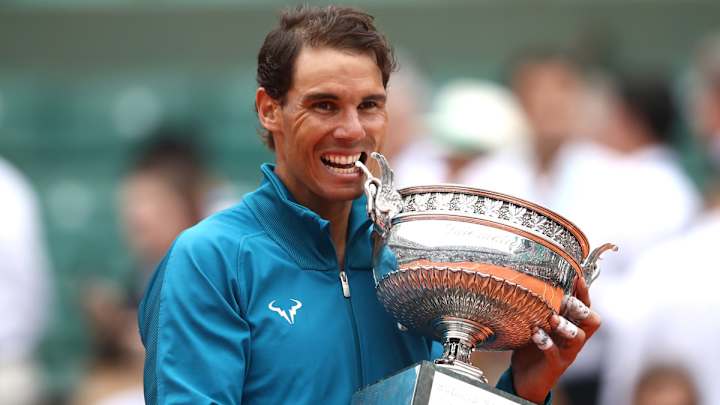Eleventh Heaven: Nadal as Good as Ever in Winning 11th French Open

PARIS - Siri, what animals are considered to have no natural enemies, no known predators?
Tigers, saltwater crocodiles, whale sharks and electric eels may be the disgorged answer. But we know better. There is also a fifth species: Rafael Nadal on a court surfaced with clay.
When Nadal is set loose in his natural habitat, the rest of the tennis fauna is rendered prey. And there is no one above him on the food chain. For the duration of his pro tennis career—now, remarkably, 15 years—Nadal has won more than 90 percent of his matches played with granules of dirt underfoot.
And at the French Open, Nadal is particularly devastating. After rolling through seven rounds of play this year and taking out Austria’s Dominic Thiem 6-4, 6-3, 6-2 in Sunday’s final, Nadal is now 86-2 at Roland Garros, winning a record 11 titles—winning more than any other male player in history has won any other Slam. (For perspective, inevitably: Roger Federer is 91-11 with eight titles on his preferred milieu, the grass of Wimbledon.) “Rafa is too much on clay,” says Thiem. “It's kind of like a joke.”
50 Parting Thoughts From Roland Garros 2018
The reason for Nadal’s comical success on the surface? Some redounds to tennis X’s and O’s. No player in the sport’s history possesses his combination of offense and defense, a marriage of merciless power with relentless retrieving. Watching Nadal on clay brings to mind the line about Willie Mays at the plate, “The only player who could possibly catch that ball, just hit that ball.”
Add Nadal’s virtue of playing left-handed and it borders on unfair. His spin-drizzled cross-court forehands (the most natural shot in tennis) bounce high to a righty’s backhand (perhaps the difficult shot in tennis.) When righties like Thiem try and hit backhands off Nadal’s parabolas, it recalls men trying to use shovels to swat flies.
But also, constitutionally, this is the perfect surface for Nadal. Clay makes demands of players, both physical and spiritual, no other surface does. There is a required persistence—within rallies; within matches; within the two-week event—that plays perfectly to the core strengths of Nadal, a player who is happy to withstand discomfort. Clay court tennis is quite simply (and quite literally) trench warfare. Nadal is happy to engage.
For all the athletes who possess irrational confidence—I could be LeBron if I were in the right situation—Nadal, even at age 32, suffers the opposite affliction: an irrational deficit of confidence. Despite winning the title 10 times since 2015, he refused to declare himself the pre-tournament favorite. To Nadal, every opponent brings danger, every round could be his last.
If it sounds like so much false modesty or sandbagging, it’s not. He has thoroughly convinced himself that he is not yet where he wants to be. And Nadal has convinced himself that doubt brings motivation, not paralysis. After Nadal won his quarterfinal match over Diego Schwartzman—the lone player to whom he lost a set this tournament—he was asked about the role of uncertainty. “If you don't feel the pressure, it’s because you don't love the sport. And if you don't love the sport it’s better to go back home and do another thing...Pressure is good. You are able to control that. That pressure, that adrenaline, can be in a positive way.” But why does he allow himself to feel the pressure? Nadal had a simple response. “I am a human person.”
On Sunday, Nadal started the match slowly—as he often did this tournament—facing break points and projecting frustration. And then he found a level that…well...you are forgiven for questioning whether he is a human person. Nadal found the range on his serve and forehand. He preyed, predictably on Thiem’s one-hander. Most of all, he repelled attack and negated everything the opponents had to offer.
It may be a myth in other sports. But for tennis played on clay, defense does win championships. Eleven of them, in fact. And counting.

Jon Wertheim is a senior writer for Sports Illustrated and has been part of the full-time SI writing staff since 1997, largely focusing on the tennis beat , sports business and social issues, and enterprise journalism. In addition to his work at SI, he is a correspondent for "60 Minutes" and a commentator for The Tennis Channel. He has authored 11 books and has been honored with two Emmys, numerous writing and investigative journalism awards, and the Eugene Scott Award from the International Tennis Hall of Fame. Wertheim is a longtime member of the New York Bar Association (retired), the International Tennis Writers Association and the Writers Guild of America. He has a bachelor's in history from Yale University and received a law degree from the University of Pennsylvania. He resides in New York City with his wife, who is a divorce mediator and adjunct law professor. They have two children.
Follow jon_wertheim